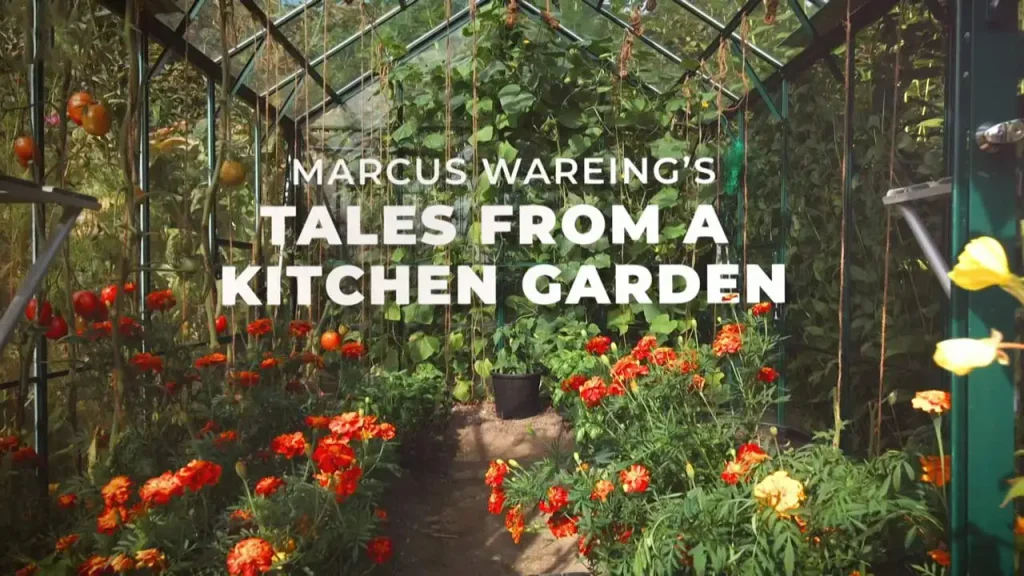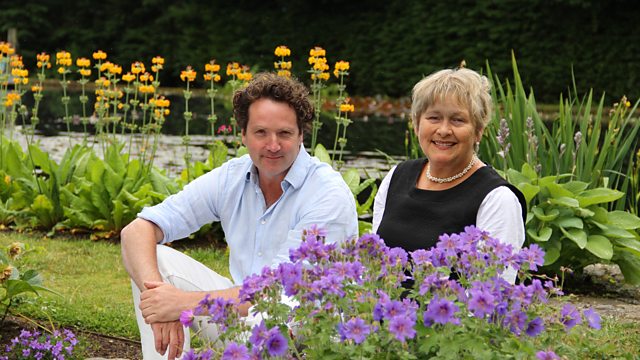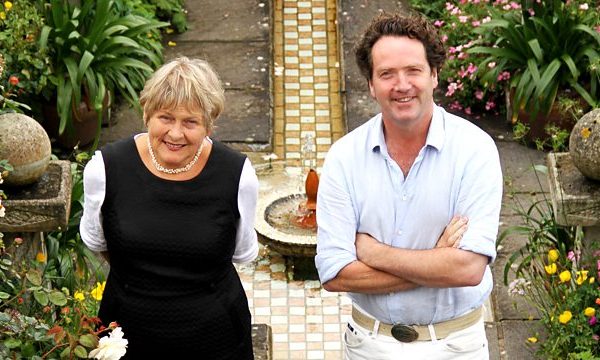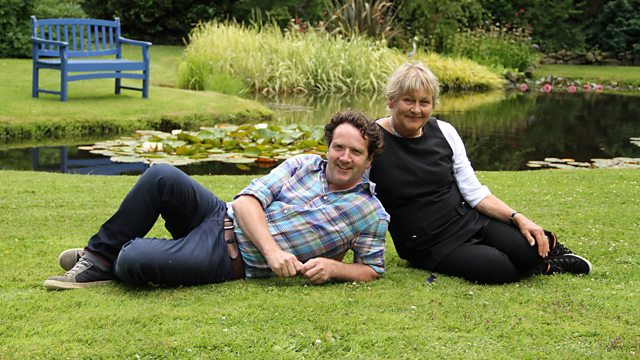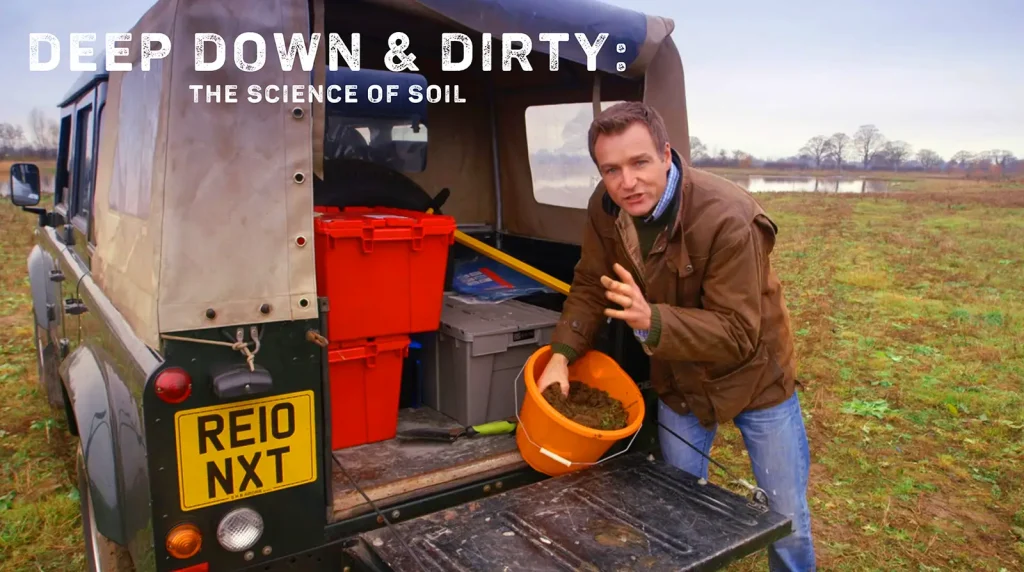Marcus Wareing’s Tales from a Kitchen Garden 2023 Episode 20 – In the heart of Sussex, nestled amidst rolling hills and lush greenery, Marcus Wareing’s smallholding stands as a testament to his passion for agriculture and gastronomy. As the amber hues of autumn begin to paint the landscape, the time arrives to reflect on the summer’s yield from the kitchen garden. With winter’s chill just around the corner, it becomes essential to harness and preserve the bountiful summer produce to ensure they sustain their freshness throughout the colder months. Seeking inspiration for this task, Marcus turns to his dear friend and accomplished chef, Colin Wheeler. Known for his innovative culinary techniques, Colin graciously accepts the invitation to spend a day on the smallholding, introducing Marcus to a treasure trove of ideas.
Together, they delve into the world of fermentation, creating a rich and tangy fermented cabbage. Then, they transform luscious summer pears into a fine smoked pearpowder, a process that captures the fruit’s essence in an entirely new way. Lastly, they embark on a journey to brine whole apples, ensuring their crispness and flavor are perfectly preserved.
Away from the hustle of the kitchen, Marcus is aware of the sheer joy the children at Grovelands School Farm derive from tending to their beloved goats. To further enhance their experience, Marcus conceptualizes a whimsical goat see-saw. He enlists the help of his long-time friend Zoe, and her expert carpenter husband, Lindsay. Together, they design and craft this unique piece, and as they had hoped, both the children and the playful goats are overjoyed with this new addition.
But the festivities at the smallholding don’t end there. In gratitude for the unwavering support and invaluable advice he has received from the local community, Marcus decides it’s time to celebrate. He sends out invitations for a grand feast at his farm. The community’s response is heartwarming, with every individual contributing a dish, symbolizing the collective spirit. For his part, Marcus prepares a delectable pot of barbecue beans paired with a succulent flame-grilled beef rib, honoring both the land he’s cultivated and the cherished bonds he’s nurtured along the way.
Marcus Wareing’s Tales from a Kitchen Garden 2023 Episode 20
Marcus Wareing’s Tales from a Kitchen Garden 2023 Episode 20
In the heart of Sussex, nestled amidst rolling hills and lush greenery, Marcus Wareing’s smallholding stands as a testament to his passion for agriculture and gastronomy. As the amber hues of autumn begin to paint the landscape, the time arrives to reflect on the summer’s yield from the kitchen garden. With winter’s chill just around the corner, it becomes essential to harness and preserve the bountiful summer produce to ensure they sustain their freshness throughout the colder months.
Seeking inspiration for this task, Marcus turns to his dear friend and accomplished chef, Colin Wheeler. Known for his innovative culinary techniques, Colin graciously accepts the invitation to spend a day on the smallholding, introducing Marcus to a treasure trove of ideas. Together, they delve into the world of fermentation, creating a rich and tangy fermented cabbage. Then, they transform luscious summer pears into a fine smoked pear powder, a process that captures the fruit’s essence in an entirely new way. Lastly, they embark on a journey to brine whole apples, ensuring their crispness and flavor are perfectly preserved.
Away from the hustle of the kitchen, Marcus is aware of the sheer joy the children at Grovelands School Farm derive from tending to their beloved goats. To further enhance their experience, Marcus conceptualizes a whimsical goat see-saw. He enlists the help of his long-time friend Zoe, and her expert carpenter husband, Lindsay. Together, they design and craft this unique piece, and as they had hoped, both the children and the playful goats are overjoyed with this new addition.
But the festivities at the smallholding don’t end there. In gratitude for the unwavering support and invaluable advice he has received from the local community, Marcus decides it’s time to celebrate. He sends out invitations for a grand feast at his farm. The community’s response is heartwarming, with every individual contributing a dish, symbolizing the collective spirit. For his part, Marcus prepares a delectable pot of barbecue beans paired with a succulent flame-grilled beef rib, honoring both the land he’s cultivated and the cherished bonds he’s nurtured along the way.
The Renaissance Man of the Culinary World
Marcus Wareing stands as one of the most accomplished and multi-talented chefs in Britain today. His prestige stems not only from his exceptional culinary skills but also his foray into the media spotlight through books and television. This section will explore his illustrious career and what led him to become a household name.
Born in 1970 in Southport, England, Marcus found his passion for cooking during his adolescence. He embarked on his formal training at the tender age of 15, when he began a 3-year apprenticeship at the Savoy Hotel. This experience ignited his deep appreciation for classical French technique, which he would later fuse with modern British elements to create his signature style.
His dedication was evident, as he rapidly rose through the ranks in reputed kitchens like Le Gavroche. At the age of 26, he secured the position of sous chef at the famed Pierre Koffmann’s La Tante Claire, where he spent three valuable years. This prepared him for his next major role as the head chef of L’Oranger, where he achieved a Michelin star at the remarkable age of 27.
However, it was his collaboration with the legendary Gordon Ramsay that truly catapulted him into culinary stardom. He worked as Ramsay’s right-hand man for 15 years across several critically acclaimed restaurants. Over time, Marcus grew eager to branch out independently. In 2008, he opened his flagship Marcus Wareing at the Berkeley in London, earning an impressive two Michelin stars. He hasn’t looked back since.
What makes Marcus shine as a celebrity chef is how he has seamlessly blended his passion for food with a keen media savvy. Not only has he authored bestselling cookbooks like Marcus at Home, he has also hosted popular shows like MasterChef: The Professionals, further entrenching his star status. Despite his phenomenal accomplishments, Marcus retains a down-to-earth charm, evident in how he engages with his community and mentors upcoming talent. At just 53, there is no doubt Marcus Wareing will continue to enthrall food lovers for decades to come through his stellar skills and magnetic persona.
The Picturesque Serenity of the English Countryside
Nestled in East Sussex, Marcus’ latest project, a quaint homestead brimming with organic produce, offers the perfect pastoral escape from city life. The allure and tranquility of the English countryside provide an ideal backdrop as Marcus explores his zeal for wholesome, farm-to-table cuisine.
Sussex, with its gently undulating meadows, sleepy villages and Neo-Elizabethan manors, evokes a quintessential English charm. The vibrant emerald fields that stretch as far as the eye can see are interspersed by patches of woodland and the occasional flock of sheep. Gentle streams cut through the landscape, their trickling water both mesmerizing and soothing.
The rich history engraved in sites like Bodiam Castle and Battle Abbey offer glimpses into the past. Meanwhile, the seaside towns of Brighton and Eastbourne allow one to breathe in the fresh, salty air with fish and chips in hand. For an authentic taste of Sussex produce, the local farmer’s markets are brimming with just-picked berries, artisanal breads, and farm-fresh dairy.
This tranquil haven provides Marcus with great joy and creative inspiration. Getting his hands dirty while tending to the land and appreciating nature’s bounty in its purest form fuels his passion. The seasonal vegetables, fruits, and herbs from his kitchen garden serve as the foundation for his farm-to-table feasts. Away from the fast-paced London food scene, Marcus finds his true calling in celebrating wholesome, ethical produce while relishing the laid-back country lifestyle.
The Ancient Art of Food Fermentation
During his day on the smallholding with Colin Wheeler, Marcus gains valuable insights into fermentation, one of the oldest food preservation techniques known to mankind. This section will provide a primer on how the process works and why it enhances both flavor and nutrition.
Fermentation relies on beneficial microorganisms like yeast and bacteria to convert sugars into acids, gases or alcohol. Food items are placed in a brine or immersed in a culture starter, which kickstarts the microbial activity. This is what gives fermented foods like sauerkraut, kimchi and kombucha their characteristic tang.
The lactic acid generated through fermentation not only adds a pleasant sourness but also prevents harmful bacteria from growing. This allows perishable produce to be preserved for months while enhancing its probiotic content. Fermented foods aid digestion, strengthen immunity and promote overall gut health. The array of flavors produced via fermentation is astounding. Sauerkraut delivers a bright, acidic crunch. Misos and soy sauces contribute an umami depth. The effervescence and subtle sweetness of kombucha is beautifully balanced by its vinegary bite. Harnessing these flavors allows chefs like Marcus and Colin to create inventive dishes that are both nutritious and delicious.
With fermentation making a major comeback among health-conscious consumers, Marcus is keen to incorporate traditional techniques like pickling, brining and curing across his farm-to-table meals. Preserving the essence of peak seasonal ingredients to enjoy year-round aligns perfectly with his culinary ethos.
The Transformative Magic of Smoking
During their day of culinary experimentation, Colin introduces Marcus to the art of smoking fresh produce to lend an exciting new dimension of flavor. By enveloping the food in fragrant smoke, its original essence is intensified in remarkable ways.
There are two primary smoking techniques – hot smoking and cold smoking. Hot smoking employs temperatures between 150-180°F. The heat cooks the food while infusing it with a rich, smoky taste. Meat, fish and cheese are commonly hot smoked. Cold smoking only uses 65-110°F heat, allowing the smoke to gently penetrate without cooking. Fruits, vegetables, spices, salt and sugars are often cold smoked to add subtle complexity. A variety of aromatic woods like hickory, pecan, applewood and mesquite can be burned to produce the smoke. Each imparts its own unique bouquet. The smoked item absorbs these complex layers of smell and taste.
Smoking was traditionally used to preserve and prolong storage. But today, it is valued for the wonderful complexity it adds. Smoked fruit powders are having a major renaissance in fine dining. Their potent taste makes them ideal as rubs and seasoning blends. After witnessing Colin prepare smoked pear powder, Marcus is inspired to try smoking produce from his farm. Infusing his fresh harvest of pears, plums, cherries and apples with a natural smoky essence can create addictive flavors to spice up desserts, marinades and more!
The Lost Art of Fruit Brining
In addition to smoking, Colin also passes on another age-old technique that excites Marcus – fruit brining. This method delivers lip-smacking flavors by infusing fruits with savory, salty and sour notes.
The process involves submerging fruits in a saltwater solution known as brine. Spices, vinegars and sweeteners are also added to provide complexity. Over 2-3 weeks, a slow fermentation happens within the brine. The fruit’s inherent sugars and water diffuse into the solution, which then penetrates back, curing the produce. This slow exchange of flavors allows even bland fruits to shine. The brined fruit develops a thin preserved skin and a tender, pickled interior. When sliced, it offers a fascinating interplay of sweet, sour, salty and umami.
Incorporating brined fruit into meals reveals its versatility. It can provide a sweet-tart pop of flavor sprinkled on salads or cheese boards. Blending it into condiments like chutneys, relishes and jams lends depth and intrigue. And pairing pickled fruits with roasted meats introduces thrilling flavor contrasts. After Colin’s masterclass, Marcus feels newly inspired to brine his harvest of apples, peaches, plums and pears. Their bright pickled flavor would elevate everything from breakfast pots to cheese platters when entertained guests over the holidays!
Adding Playful Delight to the Children’s Farm Experience
Marcus greatly values community and supporting local charities. This led him to fund a whimsical new addition for the children at the nearby Groveland’s School Farm. The goat see-saw he installs adds a fun, interactive element to the children’s usual animal tending routines.
The School Farm at Grovelands offers children a one-of-a-kind opportunity to interact with farm animals first-hand. This includes feeding, grooming and caring for the goats, sheep, pigs, rabbits and hens on the premises. Research shows such hands-on activities foster confidence, empathy and social skills in children. The novel goat see-saw crafted specially for Grovelands takes the experience one step further. Now, the children can actively play and bond with the goats. The see-saw is low to the ground with small platforms on either side. As one child sits on a side, their weight lowers it. This lifts the platform on the other side, allowing the goat standing there to tilt up temporarily. Once the child gets off, the goat’s platform sinks back down raising the child back up again.
The children are thrilled with this new contraption. It adds a fun game element while teaching them about counterbalance and teamwork with the goats. The see-saw is now a highlight of their farm visits. In the children’s smiles and peals of laughter, Marcus finds profound joy and satisfaction at having contributed to the community.
Celebrating the Fruits of Community Kinship
Marcus greatly values the sense of community he has found in Sussex. To show his appreciation for their guidance and camaraderie, he decides to host a special harvest feast. This section explores the preparations for the event and the delights of his signature dishes.
The tranquil life in Sussex has provided Marcus with more than just beautiful vistas and fertile land. He has discovered a spirit of kinship and belonging through neighbors who have become like family. Whether it’s trading gardening tips, sharing homegrown produce or helping renovate his farmhouse, Marcus knows he can always rely on friendly faces. To celebrate these bonds, Marcus sends out invitations for a harvest luncheon feast on his farm. The community is touched, and everyone pitches in enthusiastically. Some offer to decorate the barn’s rustic interior with wildflowers and burlap ribbons. Others bring fresh-baked bread, apple cakes and elderberry pies made with local produce.
When the day arrives, the weather obliges with sunny blue skies. Marcus busies himself preparing two of his specialties – slowly simmered barbecue beans and juicy flame-grilled rib. The rich smoky aroma of grilled meat soon mingles with the comforting scent of baked beans wafting through the air. Marcus’ barbecue beans are packed with flavor. He simmers beans like cannellini, borlotti and butterbeans in a sauce of smoked paprika, molasses, ginger and garlic. This infuses the beans with a tangy sweetness and robust spice. Right before serving, he stirs through tender greens like kale for contrasting texture.
The dish pairs perfectly with the second highlight – giant beef ribs kissed by fire. Marcus rubs the ribs generously with spices and chilli before placing them on the grill. The smoldering embers caramelize the exterior while retaining the interior’s juicy pinkness. Every moist tender bite offers an irresistible interplay of smoke, spice and meaty richness.
The feast is a great success, with every dish reflecting the community’s spirit of camaraderie. Over food, drink and laughter, Marcus is reminded of how lucky he is to be a part of this supportive circle. Their kinship has made the farm not just a tranquil home but also a nurturing community.
Conclusion
Marcus Wareing’s passion for food and community come together beautifully on his Sussex farmstead. Through preserving summer’s bounty with Colin, enriching children’s lives, and bonding over a harvest feast, Marcus has crafted rich experiences and relationships.
His smallholding becomes a site of both nourishment and nurturing. Mastering ancient methods like fermentation and smoking allows Marcus to honor the land’s offerings and his culinary ethos. Sharing his fortune to fund a child-friendly goat see-saw enables meaningful community connections. And expressing gratitude through a hearty farm celebration cements the spirit of kinship.
Ultimately, Marcus finds joy, purpose and inspiration here – from the verdant nature surrounding him to the kindness of his newfound friends. The tales from his kitchen garden remind us to embrace not just seasonal produce but also simple pleasures, generosity and belonging.
FAQ
1. How did Marcus Wareing become such a successful celebrity chef?
Marcus found his passion for cooking early and trained under renowned chefs like Pierre Koffmann. His collaboration with Gordon Ramsay and Michelin-starred restaurants cemented his fame. Now he wows fans through restaurants, books and television.
2. What makes Sussex an ideal location for Marcus’ farm?
With its rolling hills, quaint villages and peaceful countryside, Sussex provides a tranquil escape. The fertile land offers bountiful seasonal produce, while the community gives Marcus a sense of kinship.
3. Why does Marcus value ancient food preservation techniques like fermentation?
Methods like fermentation enhance shelf-life while unlocking bold new flavors and nutrition. Harnessing these techniques allows Marcus to celebrate seasonal ingredients year-round.
4. How does the goat see-saw enrich the children’s experience at the farm?
The special see-saw enables playful hands-on engagement with the goats, teaching children empathy and responsibility through fun.
5. What made the harvest feast so meaningful?
The communal feast celebrated the bonds Marcus had forged with his new friends and neighbors. Their generosity and togetherness encapsulated the spirit of community.
